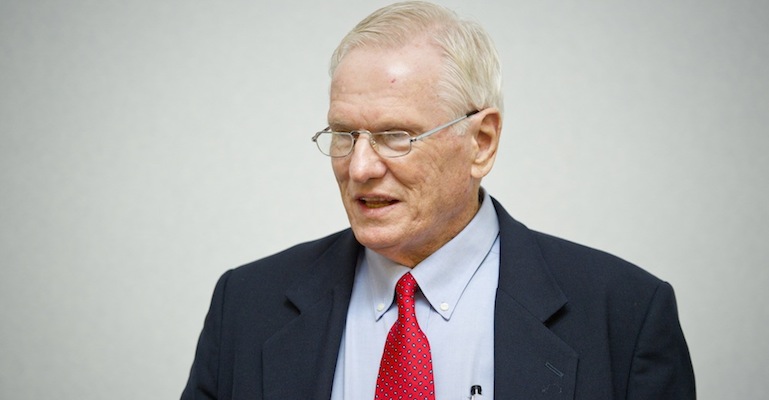3Qs: Few surprises on Super Tuesday

Ten states held primaries or caucuses on Super Tuesday, one of the biggest days of this year’s election season. We asked William Crotty, the Thomas P. O’Neill Chair in Public Life and professor of political science, to weigh in on the latest election results.
Were there any big surprises Tuesday night?
The big surprise, if there was one, was that there were no surprises. “More of the same” is the theme. Romney is getting his votes; Santorum is getting his, potentially enough to be a viable candidate; Gingrich has enough votes from winning Georgia where it might be impressive enough to get more funding to stay in the race; and Ron Paul is focusing on individual caucus states on the periphery, which has been his game all along.
For social conservatives, there’s still no one opponent to Mitt Romney. He will get the nomination, but he’s paying a price in these bitter primaries, where he’s veered off message way too much. Romney has been working on running for president for eight years and he had a game plan: focus on the economy and his experience dealing with it as a corporate executive; emphasize the failures of the Obama administration, particularly in relation to economic issues and unemployment; and finally emphasize himself as the only candidate who can beat Barack Obama. The more he focuses on side issues, which matter far more now than they will with the general electorate, the more Romney hurts himself.
A candidate needs the support of 1,144 party delegates to become the Republican presidential nominee. Is there a point when it becomes mathematically impossible for a candidate to stay in the race?
There certainly is a point when it becomes mathematically impossible to become the nominee, but under the present rules the Republicans are using in terms of proportional representation — an extremely complicated system for allocating votes — it’s also extremely hard for a candidate to pull away and win, which Romney is very much learning here.
But it’s not really about the votes right now; it’s about the money, especially in the wake of the Supreme Court’s Citizens United decision. Now, staying in the race is more about having the money, which can come from a few very wealthy donors contributing to a candidate’s Super PAC. If Gingrich and Santorum can keep up the funding, then they can stay in the race up until the convention. I’m not saying we’ll have a brokered convention — because we won’t — but this race could come down to the very end.
After Super Tuesday, arguably the biggest day of the campaign so far, what comes next?
The milestones that are coming up in the next several weeks favor the social conservatives, which will cause enormous problems for Mitt Romney. The races in Kansas, Alabama and Mississippi are going to favor Santorum, and possibly Gingrich. It will just reiterate what is going on: the fractionalization of the party and the overwhelmingly negative aspects of the race.
What’s really significant — whether you’re reading the polls of voters that came out of Tuesday’s primaries or tracing sentiments from all the way back in the fall — is that Republican voters are saying two things overwhelmingly. One is that they want someone who will address the economic issues and the other is that they want to beat Obama. Those are the strengths of Mitt Romney, and the more he moves away from that the more he hurts himself. As the race has gone on, he’s veered off track — he’s changed his message again and again — and that doesn’t make sense. He had a plan figured out and he should’ve just followed through. Economics divides the country and divides the party — and that should be the basic concern for Romney.





